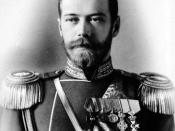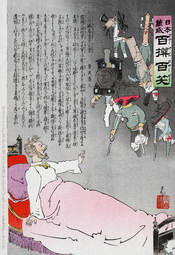Many feel that revolutions happen by some type of revolt or anarchy within a country that overthrows the government. This is completely untrue. Nicholas V. Riaganvosky says it best by stating, "Revolutions occur...when there is growth, advance, and high expectations." These are exactly the conditions in Russia that ripened revolution in 1917. In Russia, there was much hope and expectations given to them to allow the nation to grow. Unfortunately, these were soon dashed away and began revolution.
The seeds of revolution extended as far back as 1825 when Tsar Nicholas I was in power. Under his reign, Russia was a backwards nation. While other nations had railroads, scientific farming, and industry, Russia remained agrarian, farming by superstition, and riding on horseback. Nicholas refused to change the nation and make it more Western. This led to Russia being behind the times throughout the late 19th century and early 20th century.
After Nicholas, Alexander II came into power and used his force of logic to attempt to advance Russia. His first major reform was to free the Serfs. On the surface, this emancipation appears to be great for Russia and give them hope. But, it would be dashed. The newly released were given very little land as well as had a head tax which was ten percent more than the gentry had to pay. Also, they were required to pay redemption payments for the land. The Serfs made up eighty percent of the population and were given no education, so most did not know how to live. The taxes and no education forced all Serfs into a low class instead of a middle one.
Another reform was the Zemstovs. They were local administrative units that carried out small tasks such as famine, snow, and insurance. This seemed to give the people...


